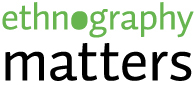Renewing Ethnography: Exploring The Role of Applied Ethnography At EPIC 2012 [guest contributor]
Editor’s note: This month’s guest contributor, John Payne, is also the co-chair of EPIC 2012, an annual conference for ethnographers working in industry. Below, John shares with us some of the highlights for this year’s conference, like guest speakers and panels. We’ll be hearing more from John about history of ethnography as a method in design. In the meantime, it’s not too late to register for EPIC!
If you are attending EPIC in Savannah, we would love to feature your notes and experience!
And do read over John Payne’s insightful 3-part series post in this month’s edition of Ethnography Matters: Teaching Ethnography For User Experience: A Workshop On Occupy Wall Street. -Tricia
Check out past guest bloggers. Ethnography Matters is always lining up guest contributors, we would love to feature your work! Send us an email!
____________________________________________________
After several years of economic recession, a year of political ferment and the rise of the global Occupy movement, it is hard not to conclude that renewal is part of the zeitgeist of our times. This opens up an important question for those who practice applied ethnography: What’s our role in renewal and how and why might we renew ourselves?
This year, EPIC (The Ethnographic Praxis In Industry Conference) takes on the ambitious topic of Renewal, renewal of economies, of society, of business and of the practice of ethnography itself. What are our responses when calls for renewal are made inside and outside of the organizations in which we live and work? Are we agents of renewal or do we have a role to play challenging such agendas? We invite you to join us and a few hundred of your peers in ethnographic practice this October 14th -17th at Savannah College of Art and Design in Savannah, GA for the 8th annual gathering of EPIC to discuss these, and other critical questions.
Our program includes three-and-a-half days of presentations of peer-reviewed papers, short and ‘to the point’ Pecha Kucha presentations, workshops to expand and share your skills, and an artifact installation (an expansion of our posters category). Recognizing that the value of events like this are truly realized through informal conversation, we have designed in spaces and times for reflection, conversation and dialogue with our presenters.
In addition, we welcome an invited panel on the intersection of ethnography and design, and our two Keynote speakers, Emily Pilloton, 2009 Pop Tech Social Innovation Fellow and founder of non-profit design firm Project H Design, and Philip Delves Broughton, journalist and bestselling author of The Art Of The Sale: Learning From The Masters About The Business of Life.
Rounding out the program are our social activities. We are lucky enough to have an exhibition, on loan from AIGA, of posters from Occupy Wall Street and a series of Local Pursuits to facilitate direct engagement with some of the cultural and economic organizations who contribute directly to the ongoing renewal of Savannah itself. Each Local Pursuit sets attendees out into Savannah on an adventure to discover aspects of it’s 279-year history-it’s exemplary but sometimes troubled relationship with preservation and renewal. We are lucky to be in Savannah this year as it offers a unique context in which to explore and reflect on the conference theme.
Intrigued? Well the countdown to the conference is on and it’s time to register – do it now to take advantage of our ‘early bird’ rate of $299. We hope to see you there.
John Payne
Simon Roberts
EPIC Co-Chairs
For further information, check out EPIC on the web:








Recent Comments